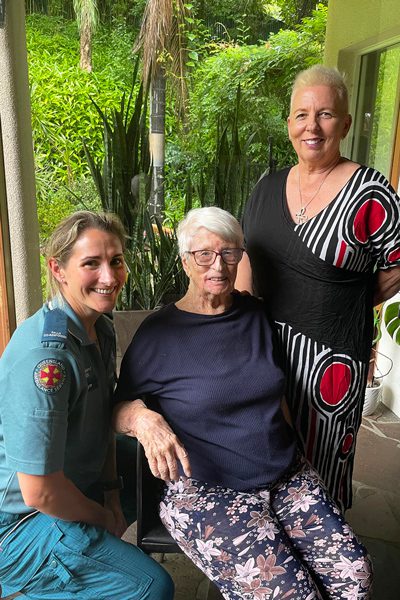How pilot program helped Dell when she fell

Falls Co-Response Program is supporting the elderly stay home and live independently. Pictured left to right, Falls Co-Response Program Manager Kym Murphy with Dell and her daughter Faye.
A pilot falls program is helping older people who have fallen with minor or no obvious injuries to stay at home independently for longer. Just ask 100-year-old Norma (Dell) Yarham and her daughter Faye Jordan.
The Queensland Ambulance Service’s (QAS) Falls Co-Response Program is a collaboration between QAS and Queensland Health and being piloted in Brisbane’s Metro North and Metro South communities.
In the Metro North area, QAS paramedics are partnered with Metro North Health’s Community and Oral Health occupational therapists and physiotherapists, harnessing their skills, knowledge, and capabilities to assess not only a patient’s health and injuries after a fall, but also their environment to prevent future falls.
Fall Co-Response Program Manager Kym Murphy recently caught up with Dell and Faye after a Co-Response team assessed Dell in January.
Dell had been living with Faye and son-in-law Alan for the last 3 years, having been widowed around 13 years ago.
Kym said Dell was healthy and quite mobile for her age, and her living area in the house had been arranged to promote her independence and accessibility to the kitchen, bathroom and living areas.
“Dell clearly values her independence; she makes her own bed each day, gets her own lunch and has dinner with the family,” Kym said.
“When our team was called to her, Dell had fallen in the kitchen while Faye and Alan were at work, but thankfully her falls alarm pendant alerted them, and they responded quickly.”
Dell said she had little recollection of what happened when she fell.
“Whether I tripped over the (walker) wheel, I just don’t know,” Dell said.
“The last fall I had was 20 years ago at an afternoon tea at church when I tripped over a little girl lying on the floor – I just didn’t see her.”
Faye, an emergency physician and research director at The Prince Charles Hospital Emergency Department, said she made Dell comfortable where she was on the floor while they waited for the Falls Co-Response team to arrive as she didn’t want to risk injuring Dell.
“On reflection it was really confronting to see a 100-year-old on the floor and Mum looked tiny and very vulnerable there still in her nightie,” Faye said.
“The team assessed Mum while she was on the floor to ensure she was stable and didn’t need any acute interventions before they moved her.
“They then got a piece of equipment called a Raizer II, which looked like a scoop that went under her back, to help lift her up. I haven’t seen one before – it was amazing.”
Dell said the team checked she was steady on her feet before helping her to her chair before checking her blood pressure (sitting and standing) to ensure they hadn’t contributed to her fall.
“They checked me over and it was good as they said I could stay here and didn’t have to go to hospital,” Dell said.
Faye said the team then had a long conversation with Dell about her fall, to piece together what and how her fall happened, and gave her a head-to-toe examination before cleaning and bandaging a nasty skin tear on her leg.
“The OT (occupational therapist) reviewed Mum’s bathroom and the living spaces, looked at furniture positioning, what the trip hazards were, and made sure mum had the safeguards like grab rails in place to hopefully prevent future falls,” Faye said.
“The fact an OT was part of the crew meant Mum’s environment was considered from a falls risk and prevention perspective – what were the things in our home which could contribute to falls and it’s really good to be reminded about them.
“The team also offered to refer us to a range of services, and I think that’s an amazing service for people in their home.”
The Falls Co-Response team then talked through their assessment and concluded they didn’t think Dell needed to go to hospital.
“To be honest, I found this gobsmacking because when a very elderly person hits the deck, you expect the outcome will be going to hospital,” Faye said.
“I was delighted a service like this could come and say to me, ‘We don’t think your Mum needs to go to hospital’. “The QAS Falls Co-Response team treated mum with such respect and kindness and their combined skills and knowledge were a real asset.
“The fact the team listened to and validated mum’s feelings about not going to hospital was really important for her too and we feel very lucky to have had this service arrive at our door to care for her.”
Faye said despite her hard cold landing, Dell only sustained a skin tear to her leg.
